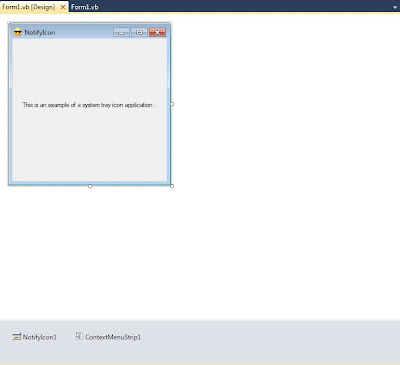This tutorial contains you the necessary code to check if a directory exists and to create one if it returns false using VB.NET.
Code:
Imports System.IO
If Directory.Exists("c:\mydir") Then
MessageBox.Show("Directory exists!")
Else
Directory.CreateDirectory("c:\mydir")
MessageBox.Show("Directory created!")
End If
Friday, January 27, 2012
Thursday, January 26, 2012
Minimize a VB.NET application to system tray using NotifyIcon
This tutorial is about using the NotifyIcon in VB.NET to minimize your application o the system tray that can be very usefull in applications that run as a server in background for instance.
Form screenshot:
Code:
Public Class Form1
Private Sub Form1_Load(ByVal sender As System.Object, ByVal e As System.EventArgs) Handles MyBase.Load
End Sub
Private Sub Form1_Resize(ByVal sender As Object, ByVal e As System.EventArgs) Handles Me.Resize
Try
If Me.WindowState = FormWindowState.Minimized Then
Me.Visible = False
NotifyIcon1.Visible = True
NotifyIcon1.ShowBalloonTip(1, "NotifyIcon", "Running Minimized", ToolTipIcon.Info)
End If
Catch ex As Exception
MsgBox(ex.Message)
End Try
End Sub
Private Sub NotifyIcon1_MouseDoubleClick(ByVal sender As System.Object, ByVal e As System.Windows.Forms.MouseEventArgs) Handles NotifyIcon1.MouseDoubleClick
Try
Me.Visible = True
Me.WindowState = FormWindowState.Normal
NotifyIcon1.Visible = False
Catch ex As Exception
MsgBox(ex.Message)
End Try
End Sub
Private Sub OpenToolStripMenuItem_Click(ByVal sender As System.Object, ByVal e As System.EventArgs) Handles OpenToolStripMenuItem.Click
Try
Me.Visible = True
Me.WindowState = FormWindowState.Normal
NotifyIcon1.Visible = False
Catch ex As Exception
MsgBox(ex.Message)
End Try
End Sub
Private Sub ExitToolStripMenuItem_Click(ByVal sender As System.Object, ByVal e As System.EventArgs) Handles ExitToolStripMenuItem.Click
Me.Close()
End Sub
End Class
Video Tutorial:
Form screenshot:
Code:
Public Class Form1
Private Sub Form1_Load(ByVal sender As System.Object, ByVal e As System.EventArgs) Handles MyBase.Load
End Sub
Private Sub Form1_Resize(ByVal sender As Object, ByVal e As System.EventArgs) Handles Me.Resize
Try
If Me.WindowState = FormWindowState.Minimized Then
Me.Visible = False
NotifyIcon1.Visible = True
NotifyIcon1.ShowBalloonTip(1, "NotifyIcon", "Running Minimized", ToolTipIcon.Info)
End If
Catch ex As Exception
MsgBox(ex.Message)
End Try
End Sub
Private Sub NotifyIcon1_MouseDoubleClick(ByVal sender As System.Object, ByVal e As System.Windows.Forms.MouseEventArgs) Handles NotifyIcon1.MouseDoubleClick
Try
Me.Visible = True
Me.WindowState = FormWindowState.Normal
NotifyIcon1.Visible = False
Catch ex As Exception
MsgBox(ex.Message)
End Try
End Sub
Private Sub OpenToolStripMenuItem_Click(ByVal sender As System.Object, ByVal e As System.EventArgs) Handles OpenToolStripMenuItem.Click
Try
Me.Visible = True
Me.WindowState = FormWindowState.Normal
NotifyIcon1.Visible = False
Catch ex As Exception
MsgBox(ex.Message)
End Try
End Sub
Private Sub ExitToolStripMenuItem_Click(ByVal sender As System.Object, ByVal e As System.EventArgs) Handles ExitToolStripMenuItem.Click
Me.Close()
End Sub
End Class
Video Tutorial:
Saturday, January 21, 2012
For Loop VB.NET / C#
This time i leave another very usefull loop, the "For Loop", in both VB.NET and C#.
Enjoy.
C#:
VB.NET:
Enjoy.
C#:
for (int i = 0; i <= 5; i++)
{
//Do your code here
}
VB.NET:
Dim i As Integer For i = 0 To 5
'Do your code here
Next iMonday, January 16, 2012
Switch Case / Select Case VB.NET / C#
I needed to remember the syntax of the switch / case for the .net languages and then i decided to share them with you here too so you can learn or remember them too.
C#:
VB.NET:
C#:
switch (option)
{
case "option1":
// code for case "option1"break;case "option2": //code for case "option2"break;default: //code for every other optionsbreak; }
VB.NET:
Select CaseoptionCase "option1" 'code for case "option1"Case "option2" 'code for case "option2"Case Else 'code for every other optionsEnd Select
Subscribe to:
Comments (Atom)
